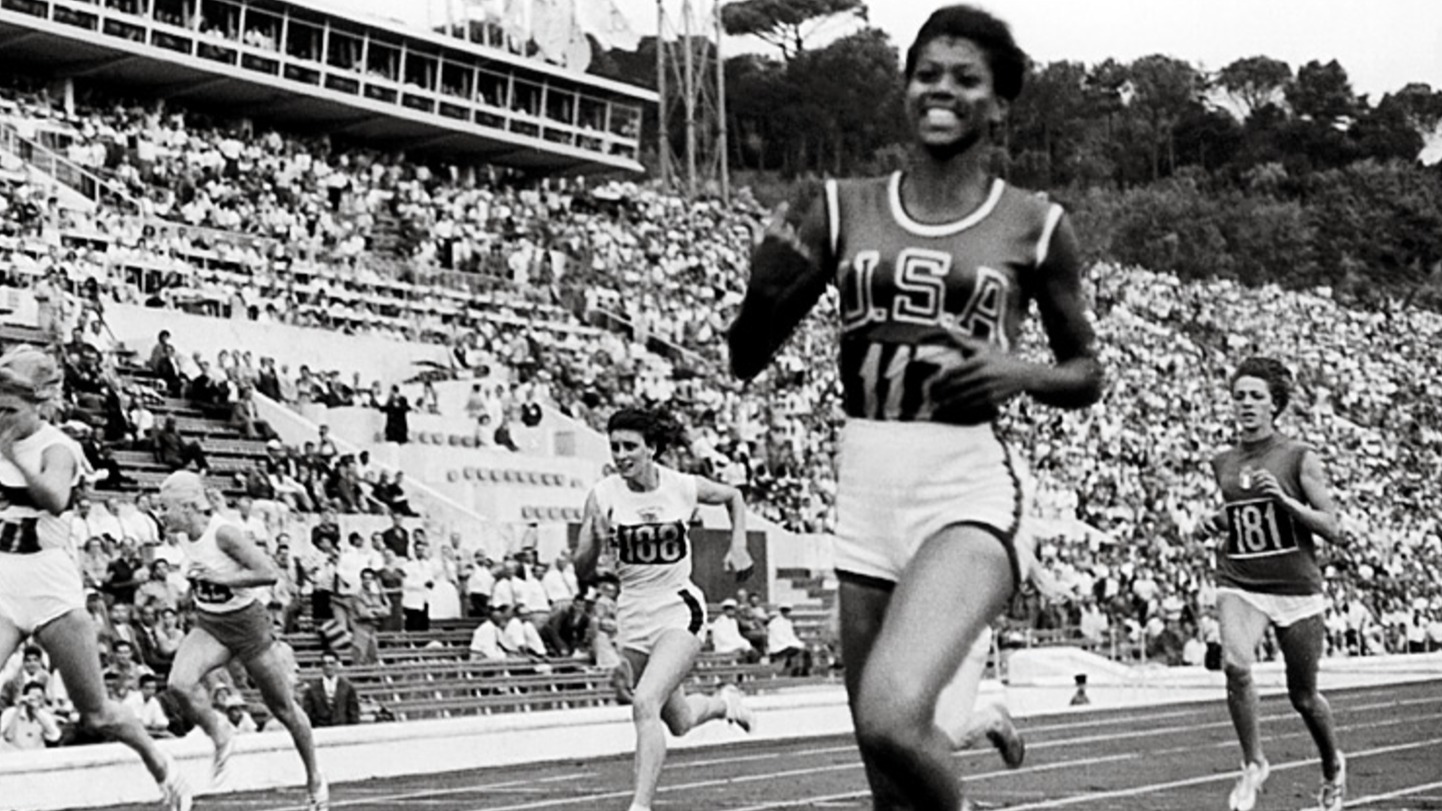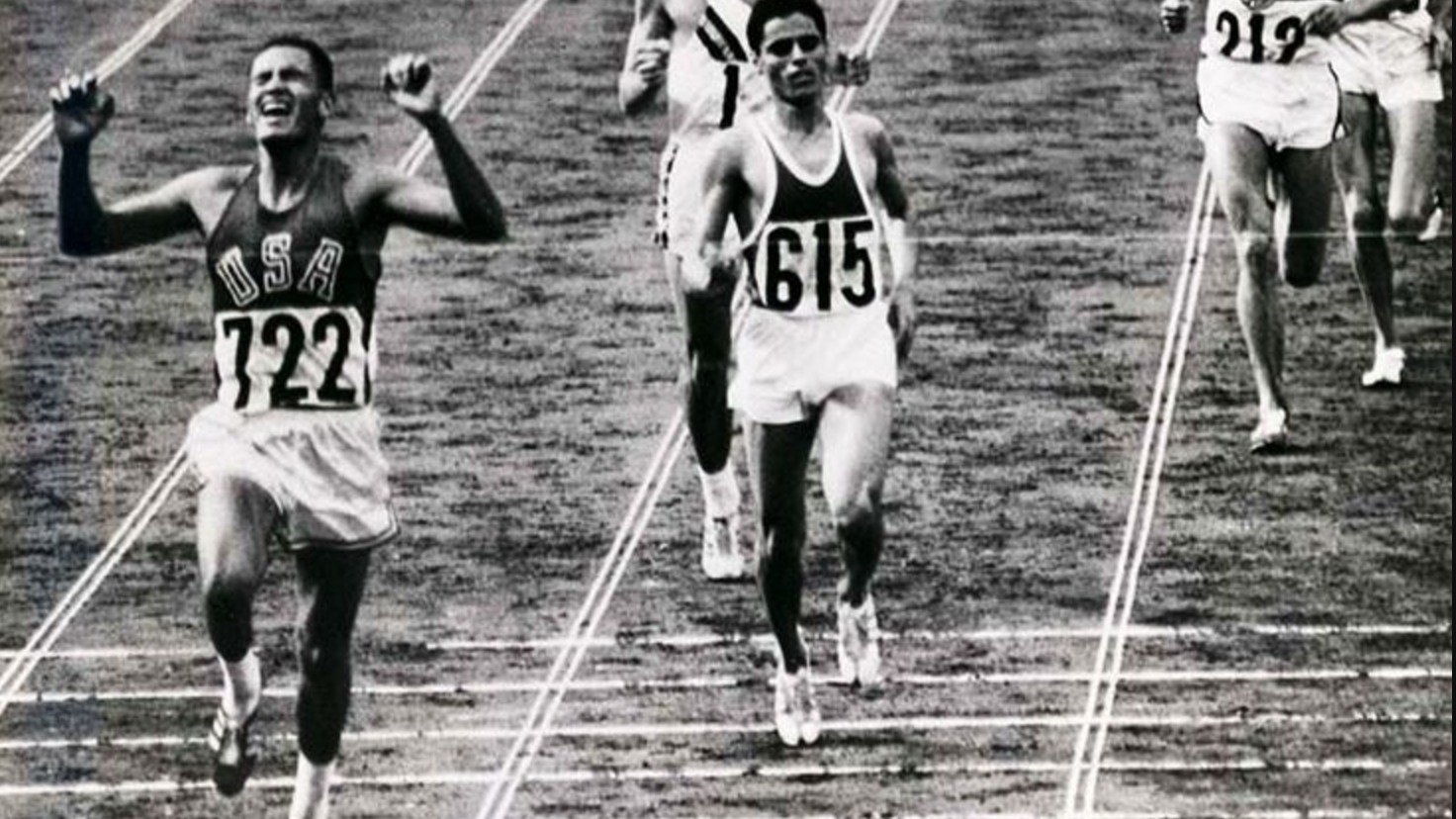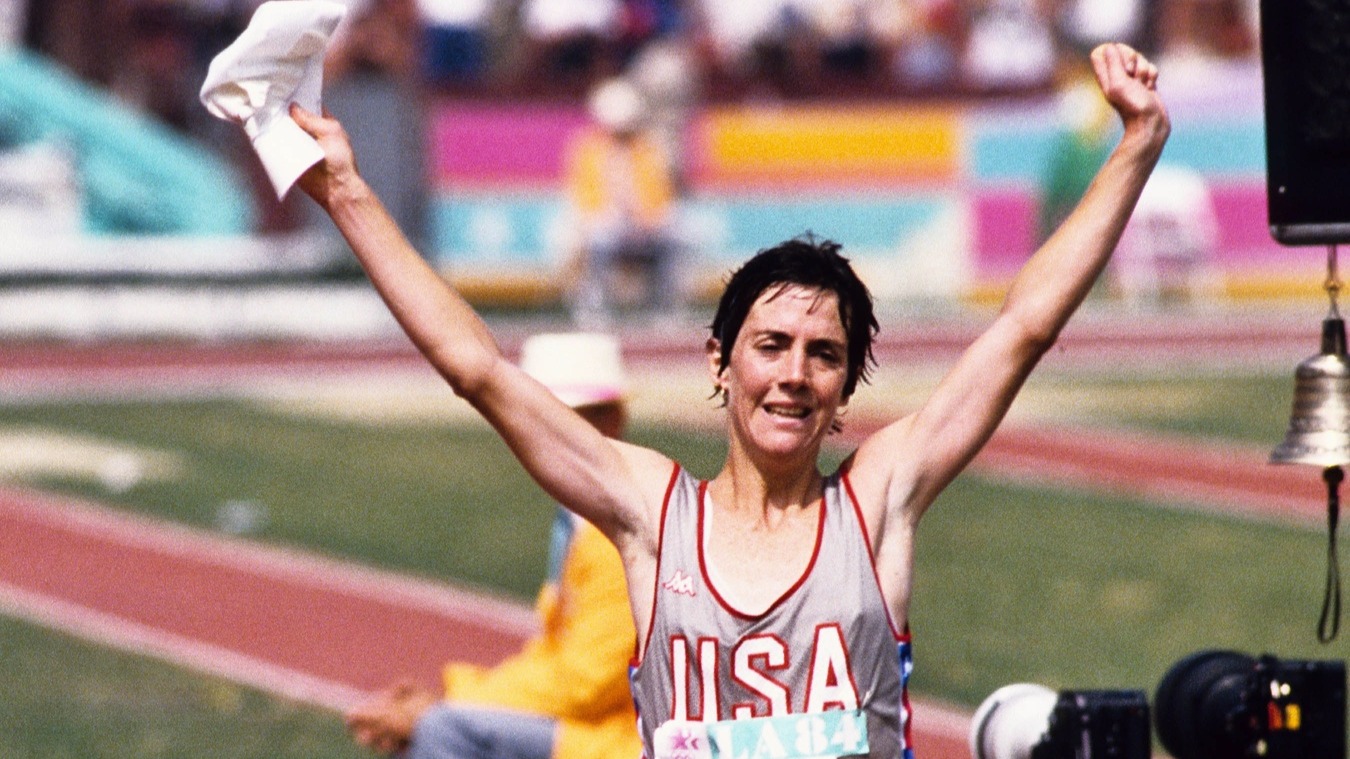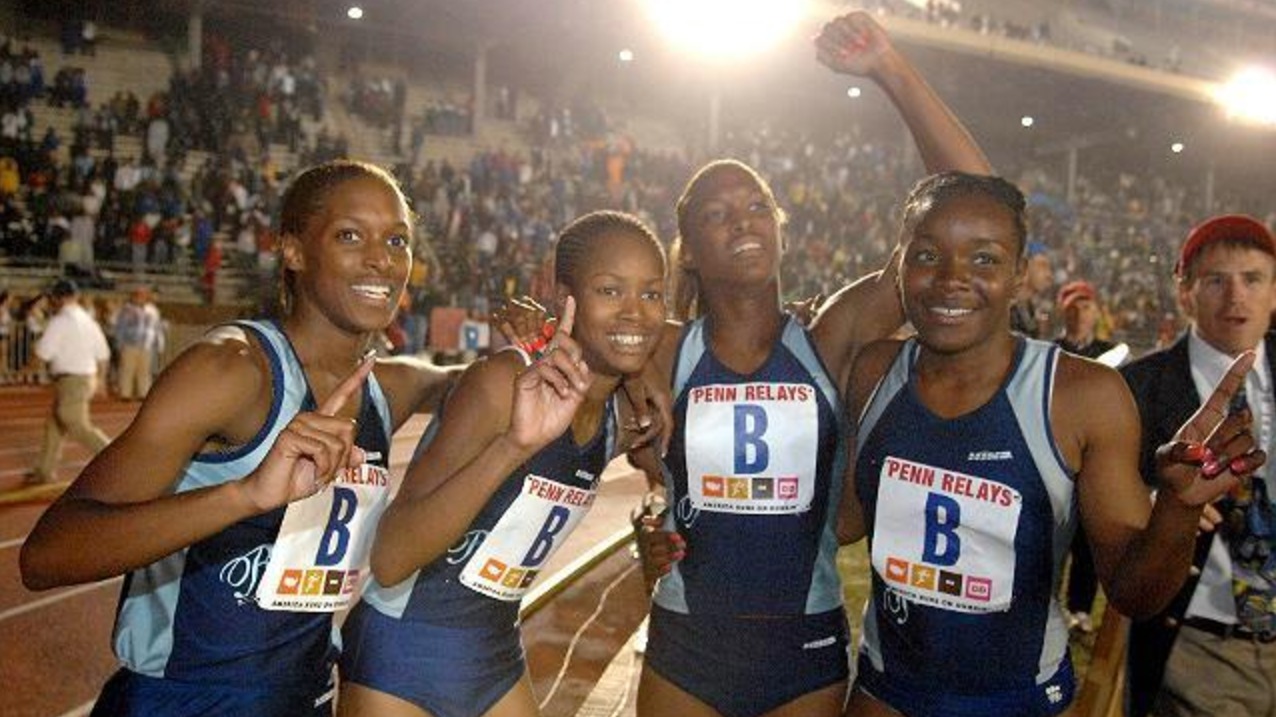Nine Times That Track & Field Stars Made Us Proud To Be American
Nine Times That Track & Field Stars Made Us Proud To Be American
Nine moments that track and field athletes made us proud to be American.
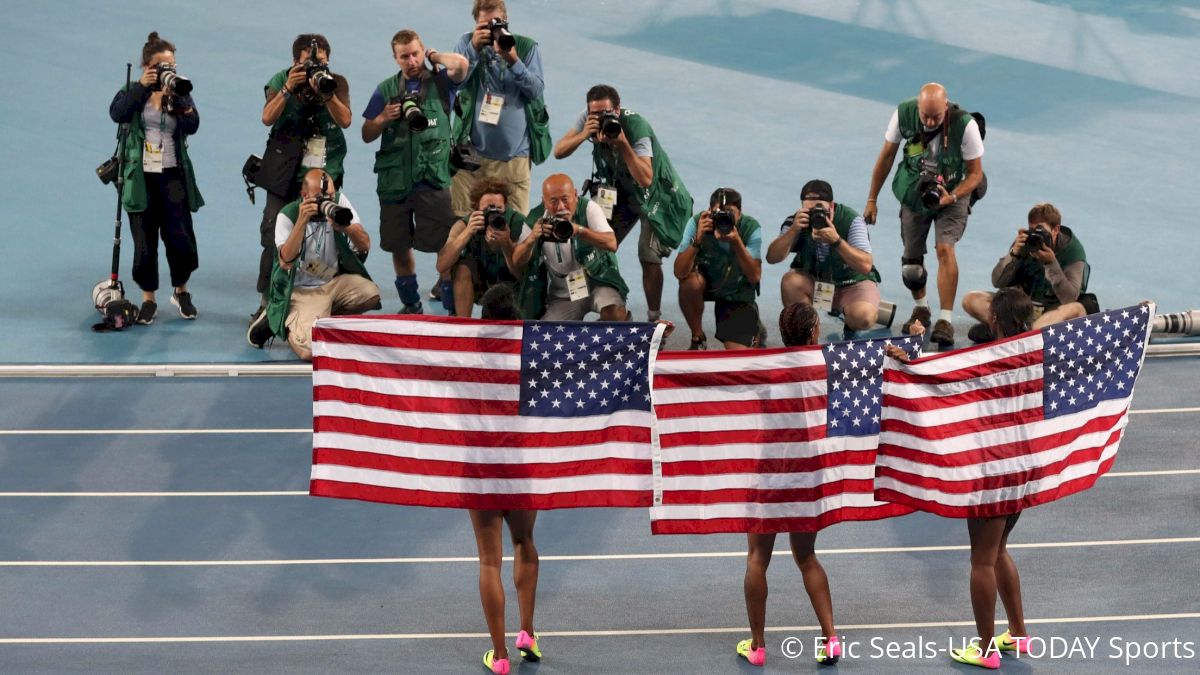
Happy Independence Day! Whether you raced your local 10K this morning or are getting ready for a day of poolside BBQ grilling, take a look back at some of the most memorable moments in track and field history that made us say, "I'm proud to be an American."
Please note: the list is in no particular order and is by no means exhaustive!
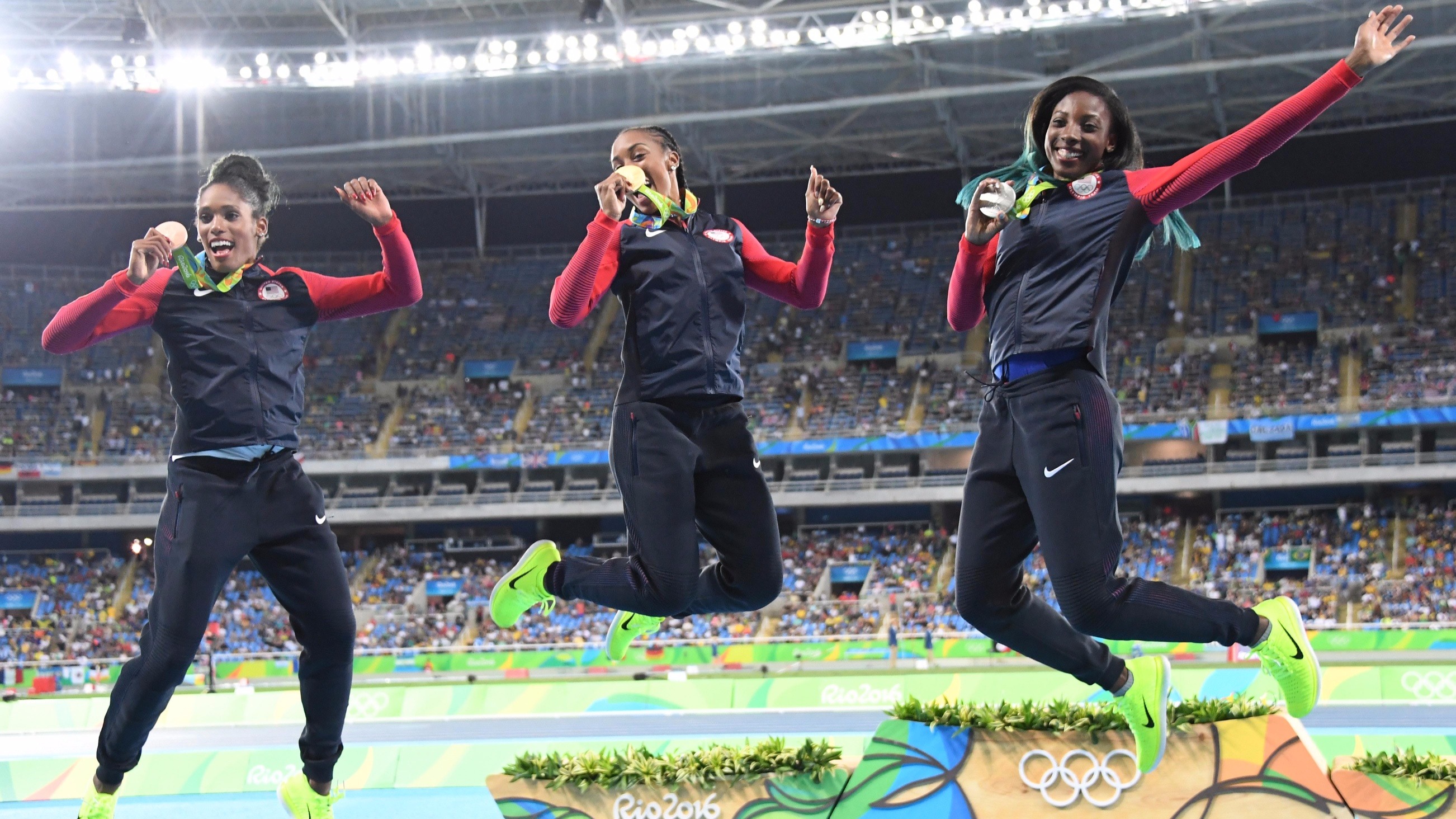
While U.S. men have swept track and field events at the Olympics 63 times since the 1896 Games, their female counterparts had never swept all three medal spots in one event until last year. In the 100m hurdles final in Rio, Brianna Rollins led Nia Ali and Kristi Castlin across the line for gold, silver and bronze in a heroic display of the red, white and blue.
The sweep was a first for U.S. women and just the seventh ever for women from any country. The Soviet Union swept both the pentathlon and the 800m at the 1980 Moscow Games, which 65 countries including the United States boycotted. So, technically, the hurdle sweep marked just the fifth time that a women's track and field event was swept by one country in a fully participatory Games.
Rollins' winning time was 12.48.
What made the sweep even more astounding was the fact that the best American hurdler was sitting at home. American record holder Keni Harrison failed to make the Olympic team by placing sixth at the Trials, but went on to set the world record in 12.20 at the London Diamond League later in the summer.
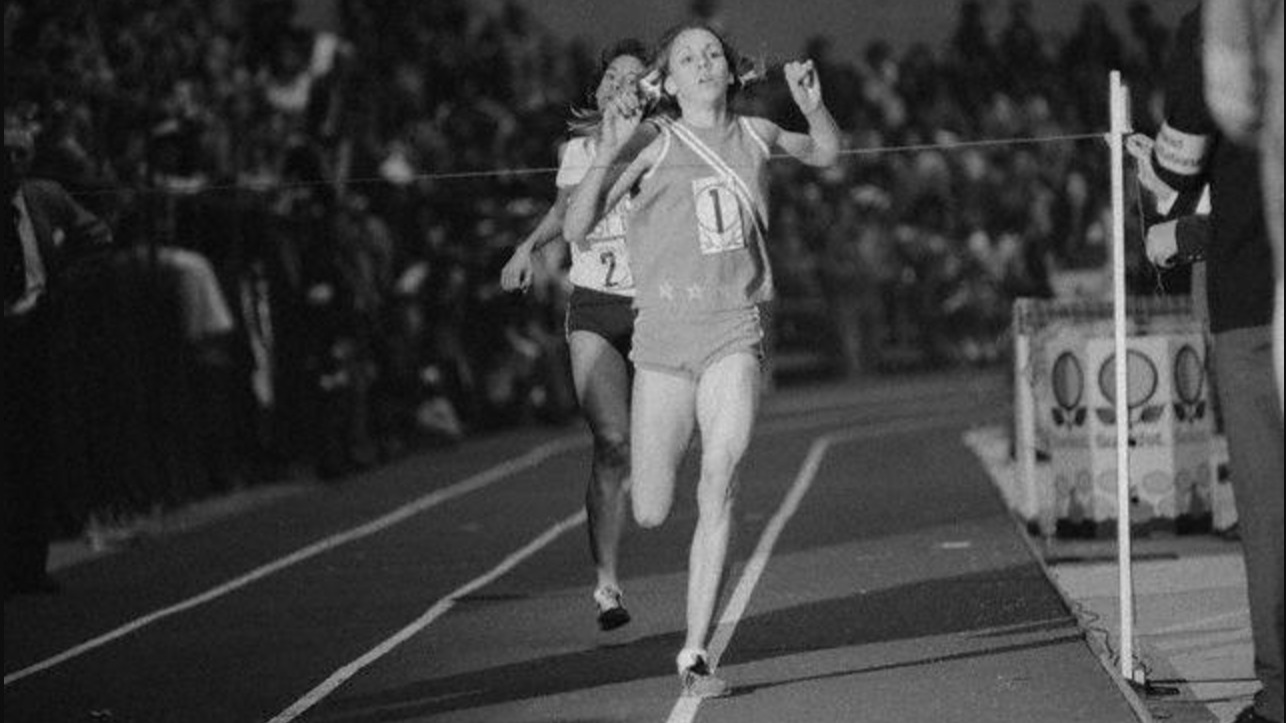
Though later in life, Mary Decker-Slaney's athletic career would come to be defined by her infamous fall at the 1984 Olympics vs. South Africa's barefoot Zola Budd, and then later, for testing positive for testosterone as a 36-year-old at the 1996 Olympic Trials, there's no denying that the young Mary Slaney was the best teen talent the U.S. had or has ever seen.
As a precocious 13-year-old, Decker was already one of the top-ranked women in the United States but deemed too young to try out for the 1972 Olympic Games. A year later, she got her chance at the USA vs. USSR dual, one in a series of heated competitions held between the United States and the Soviet Union during much of the Cold War period from 1958 to 1985.
Faced with racing the Olympic silver medalist of the previous year over 800m, Nijolė Sabaitė, 14-year-old "Little Mary Decker" didn't flinch and took down her Soviet foe with a time of 2:02.9.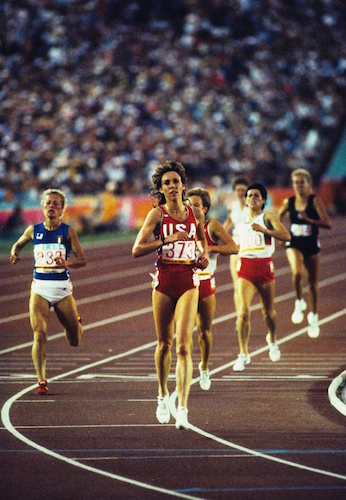
As the 1970s progressed into the 1980s, Decker found herself injured as Eastern bloc women --and specifically Soviet women-- dominated the sport of track and field. Later, their dominance was found to be the result of state-sponsored doping. But at the time, women like Tatyana Kazankina, whose career would end in 1984 when she refused to take a drug test, ruled the roost.
Kazankina was Decker's biggest rival heading into the inaugural IAAF World Championships in 1983; she was a three-time Olympic champion (1500m/800m in Montreal, 1500m in Moscow) and the world record holder for 1500m. She was the first woman to break four minutes for 1500m and her 3:52.47 world record, set in Zurich in 1980, would stand for 13 years. In 2017, it's still the third-fastest time ever run by a woman. She had also formerly held the world record for 800m, having run 1:54.94 at the 1976 Games.
Yet Decker, now 25 years old, set her own record that summer --her 3:57.12 would stand as the American record for 1500m until 2015-- and entered the Worlds in Helsinki as fearless as always, set for what would later be known as the "Double Decker" -- winning both the 3K and the 1500m.
First up was the 3K, where she led from the gun and held off Kazankina, who made a late-race charge for the win but whom would fade to third, to win in 8:34.62 with a 60-second final 400m split. Kazankina was not entered in the 1500m, leaving Decker to fellow Soviet Zamira Zaytseva, who threw elbows the whole way and cut in front of Decker for the lead with 170 meters to go. Decker drew even with 10 meters to go and won the race, 4:00.90 to 4:01.19, as Zaytseva attempted an ill-fated last-minute dive at the line.
"I thought about taking a swing at her, but then I worried about being disqualified, too. I was conscious of the U.S. vs. U.S.S.R. thing there a little. But it's lucky I didn't have a relay baton this time. I might have thrown it again," Decker said to Kenny Moore of Sports Illustrated. "I lost my temper. I caught her because I was so angry."
The reference to the relay baton is another bit of trivia gold -- while still a teenager, an enraged Decker threw her baton at her Soviet rival during the distance medley relay at a USA vs. USSR indoor event, because the other runner had allegedly cut her off.
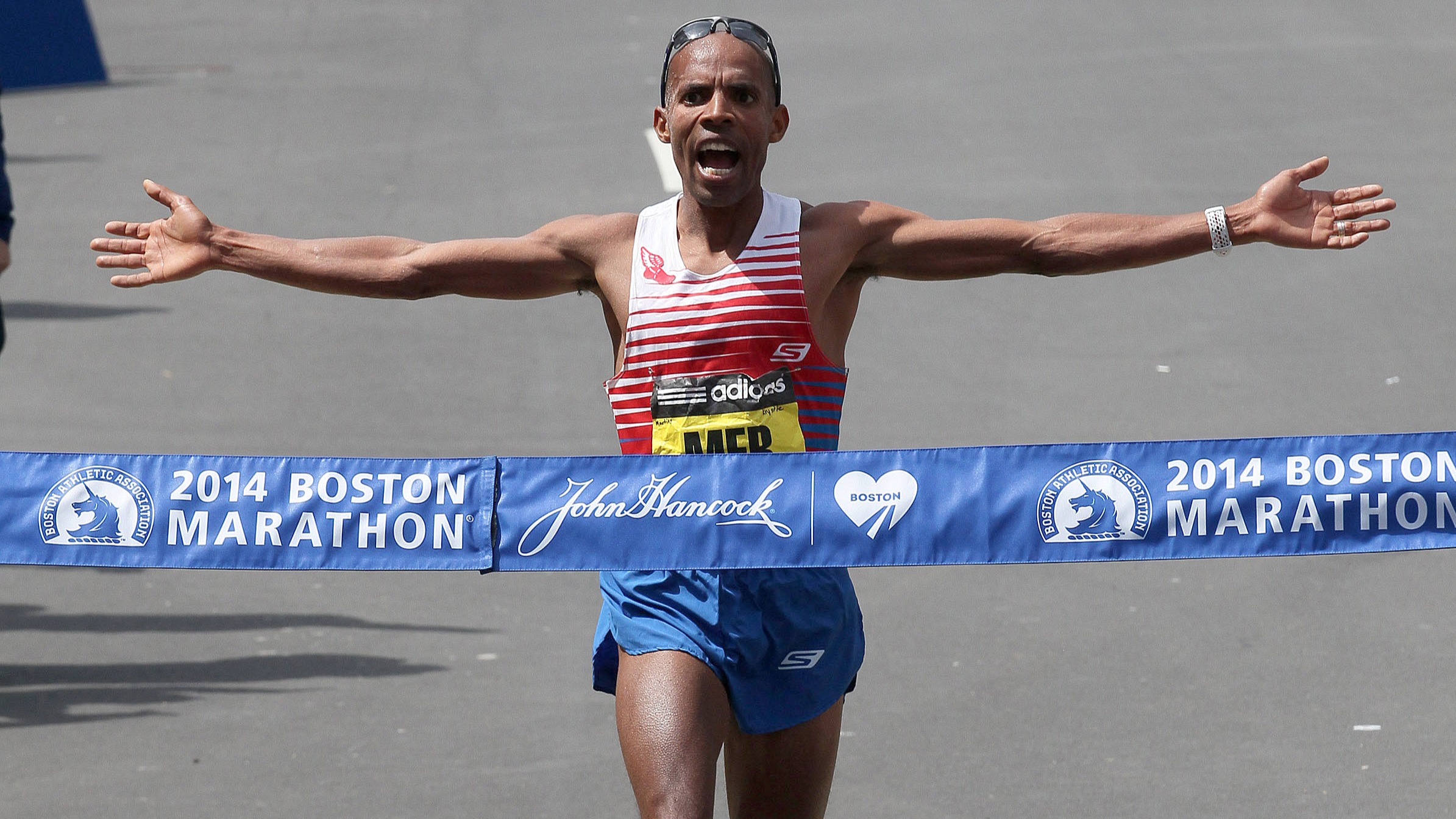
Mebrahtom (Meb) Keflezighi's life story will make an amazing movie one day. He grew up in Eritrea, but fled the country's wartime violence with his family for Italy, then settled in California in 1987 at 12 years old. He took up running in high school and earned a scholarship to UCLA, where he won four NCAA titles. He became a naturalized citizen the same year he graduated from UCLA, in 1998, and has since become one of the modern-day heroes of U.S. track and field.
In 2004, he earned the silver medal in the marathon at the Athens Olympics to become the first American man to medal in the event since Frank Shorter, who won silver in 1976 and gold in 1972. He would return to the Olympic marathon in 2012 and place fourth.
But it is the 2014 Boston Marathon that remains Keflezighi's career-defining moment. He had raced in Boston before, placing third in 2006 and fifth in 2010. Keflezighi wanted badly to race Boston in 2013, but injured kept him off the start line and on Boyleston Street with the other spectators -- where, at 2:49 p.m., two bombs went off that killed three people and injured hundreds of others.
"The reason that motivated me was because I was a spectator that day, just like Krystle [Campbell], Martin [Richard], and Lingzi [Lu], the people that died. They were just like me. I was a spectator at the 2013 Boston Marathon, not an elite athlete," Keflezighi said to Chris Lotsbom for Race Results Weekly. "People say, 'Oh you missed it because you're an elite runner.' No. The reason it touched me is because it could have been my wife, my kids, me, the runners, my brother. That day I was a spectator. That was us."
When Keflezighi returned to Boston 2014 and crossed the finish line first, then, his win was bigger than the fact that no American man had won the race since 1983, when Greg Meyer accomplished the feat.
"Usually you get a 'Congratulations' or 'Well done' after a win," Keflezighi said of the moment. "But people said 'Thank You.' Saying 'Thank You,' that's an amazing compliment'... Boston deserved that."
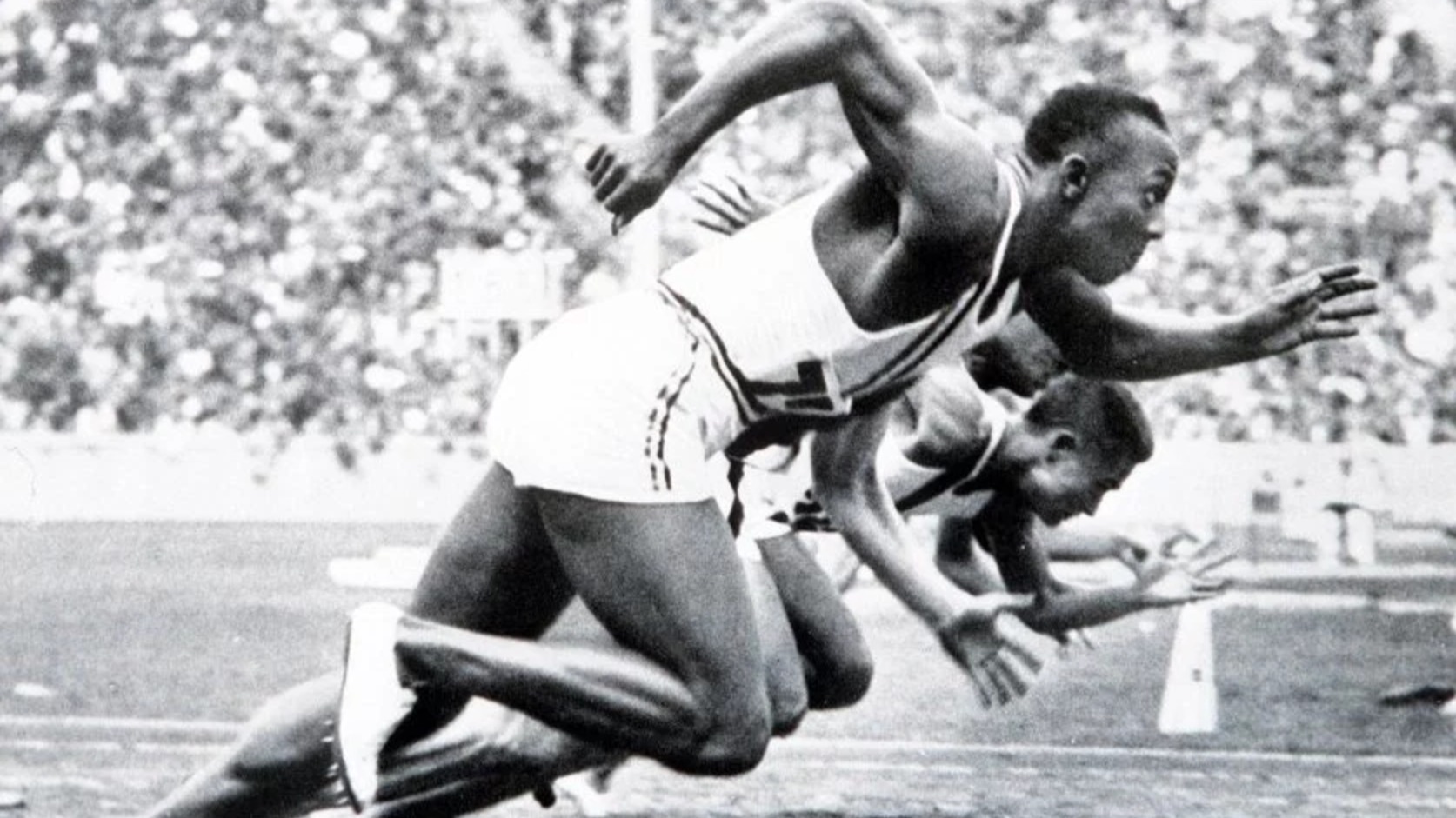
The 1936 Olympics nearly did not happen for the United States, as the Games' host city of Berlin, Germany was ruled by Adolf Hitler, whose Nazi Party was just beginning to plant its seeds throughout Europe. The Amateur Athletic Union (AAU) put the United States' participation in the 1936 Games to a vote; the athletes would be allowed to go.
Even with the AAU's permission, however, track star Jesse Owens was entreated by civil rights activists to boycott the Games in protest of segregation in the United States. Owens had already established himself as a star at Ohio State the year before in giving the world "the greatest 45 minutes ever" in sports history: he set new world records in the long jump, 220-yard dash and 220-yard hurdles, and tied the world record in the 100-yard dash.
"I wanted no part of politics," Owens said, according to the NYT. "And I wasn't in Berlin to compete against any one athlete. The purpose of the Olympics, anyway, was to do your best."
And he did, defying Hitler's white supremacist ideology by winning an unprecedented four gold medals in Berlin in the long jump, 100m, 200m, and 4x100m relay, a feat that only Carl Lewis has since been able to replicate.
It has been disputed in the retelling of history whether Hitler snubbed the champion after his four wins and purposely left the arena to avoid meeting him, or whether he shook Owens' hand or waved at him, the latter of which Owens himself claims in his autobiography. What remains clear is that the Owens again faced racial discrimination upon his return to the United States and that President Franklin D. Roosevelt never acknowledged his achievement. So while Owens' Olympic legacy is a great memory for Americans, the reaction or lack thereof to it was not an ideal moment for America.
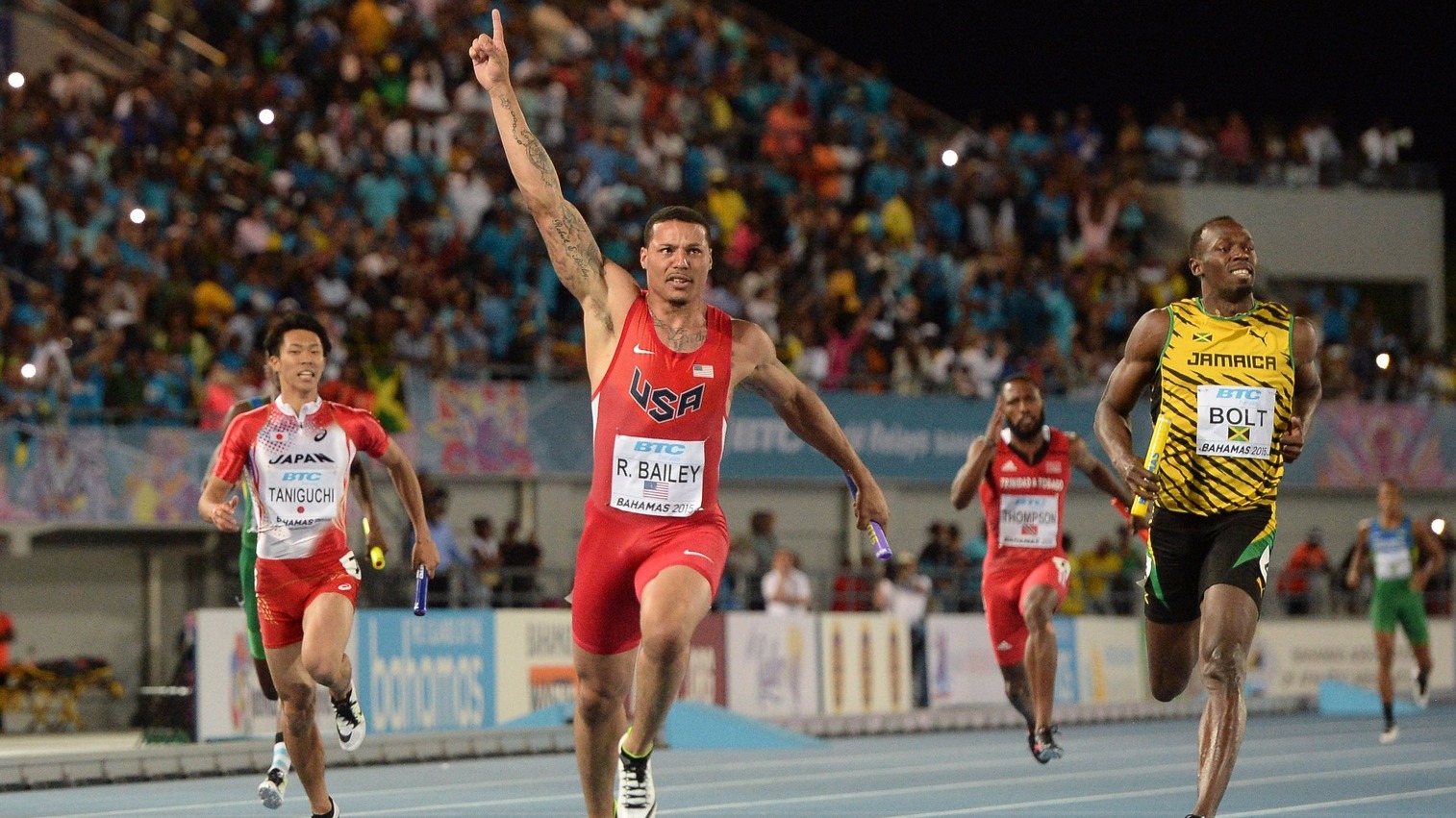
The world's fastest man doesn't lose often.
So when the Team USA quartet of Mike Rodgers, Justin Gatlin, Tyson Gay and Ryan Bailey partnered to take down the Usain Bolt-anchored Team Jamaica in the 4x100m at the 2015 IAAF World Relays, it was one of those "stand up and scream" moments for U.S. track fans.
The Americans lengthened their lead on every leg and by the time Gay got the stick to Bailey, the gap was too much for even Bolt to make up as the Americans set a championship record of 37.38.
Wilma Rudolph was the ultimate underdog, and would overcome childhood polio that disabled her leg for four years to become the icon of American women's sprinting in the 1960s.
She was born into poverty in rural Tennessee as the 20th of 22 children and suffered from several serious ailments as a child, including pneumonia, scarlet fever and, as a four-year-old, paralysis of her left leg caused by the polio virus. She was disabled and had to use a leg brace until she was eight, and did not regain full use of her leg until she was 12.
But from then on, Rudolph's athletic abilities were clear and she competed on her high school's basketball and track teams and eventually trained with the Tennessee State track coach. She made her first Olympic team as a 16-year-old, and competed in the 200m prelims and won bronze in the 4x100m at the 1956 Melbourne Games.
It was the 1960 Rome Olympic Games where Rudolph made her mark, winning triple gold for Team USA in the 100m (despite twisting her ankle), 200m and 4x100m relay. She was one of the enduring stars of the 1960 Games and her work is still one of top Olympic performances in American history.
No female American has ever won more than three gold medals in athletics in a single Games and it took 24 years for another woman to equal the record, when Valerie Brisco-Hooks earned three golds in the 200m, 400m and 4x400m at the 1984 Games.
Only two others have tied that number: Florence Griffith-Joyner won three golds in the 100m, 200m and 4x100m, plus silver in the 4x400m, at the 1988 Seoul Games; and Allyson Felix won three golds in the 200m, 4x100m and 4x400m at the 2012 London Games.
Billy Mills, born Makata Taka Hela on the Pine Ridge Indian Reservation for Oglala Sioux in South Dakota, overcame his impoverished upbringing by becoming a champion runner and earning a scholarship to the University of Kansas, where he was a multiple-time All-American.
Mills joined the Marine Corps Reserve upon his graduation and continued to train, finally qualifying for the Olympic team in 1964 in both the 10K and the marathon. He was a complete unknown heading into the Tokyo Games, as he had not even won the U.S. Trials vs. Gerry Lindgren.
The favorite was Ron Clarke, the world record holder from Australia, who dictated the pace from the get-go and made it a three-man race with 400m to go. Only Mills and Mohammed Gammoudi of Tunisia remained with him and at the bell, it was Gammoudi who took off with Clarke in pursuit.
But Mills never wavered and miraculously kicked past both men in the final stretch to win in 28:24, nearly a minute faster than his personal best and a new Olympic record.
No other American man has ever won gold over 10K at the Olympic Games.
In 2012, Galen Rupp became only the second American man to earn a medal in the event by capturing silver.
Joan Benoit Samuelson found herself --perhaps unexpectedly-- as the face of the burgeoning women's running movement by winning the first-ever women's Olympic marathon, held at the 1984 Los Angeles Games. "Joanie" was by then a two-time Boston Marathon champion with a course record of 2:22:43 (which would stand for 11 years).
Despite her accolades, Benoit's health was in question before the U.S. Olympic Trials as she underwent knee surgery just 17 days before the race. She showed up and won by 30 seconds, a feat that would foreshadow her stunning Olympic victory.
In Los Angeles, she took the lead at Mile 3 and never looked back, running to victory in 2:24:52 with no competitors in sight.
Fast forward to the 2:08 mark in the video below to hear the sound of the spectators as Benoit enters the L.A. Olympic Stadium.
Now, two and a half decades later, women are more active than ever and make up the majority of race entries -- including marathons! Thanks, Joanie.
There's a lot of Olympic moments listed on here, but for many, the Penn Relays Carnival held every year in Philadelphia is just as large in scope and fierce in competition. In 2007, a group of six girls from Eleanor Roosevelt High School in Beltsville, Maryland become the first American girls high school team to win both the 4x400m and 4x800m Championship of America titles.
The year before, the group had placed third in 4x800m despite running the third-fastest U.S. mark of all-time, and second in the 4x400m, so there was vengeance to be had against the Jamaicans, who had especially dominated the 4x800m for years -- before the 2007 victory, only one U.S. team had won since 1986.
Dominique Lockhart, Tameka Jameson and Marika Walker executed the first three legs of the 4x800m flawlessly, giving anchor Tasha Stanley the baton in close capacity to Holmwood Tech, the defending champions. It was a two-woman race and ended in a photo finish, with Stanley's kick just off enough for the win in 8:51.19, then the second-fastest mark ever recorded for a high school girls team.
Watch the 2007 4x800m Championship of America:
With the 4x800m done, Jameson and Stanley returned to the track with Takecia Jameson and Doris Anyanwu to take what was theirs: the 4x400m Championship of America title.
Now, cold, bitter rain fell on the track for the finals. Stanley took the team from third place to first on the third leg, but anchor Takecia Jameson was passed by two Jamaican teams on her leg. She stayed patient and made her move on the final curve, sealing the victory only in the final meters, similar to the 4x800m run, for an overall time of 3:39.44.
Watch the 2007 4x400m Championship of America:
A year later, E.R. would return to the Penn Relays and defend their 4x400m Championship of America title but fall just short in the 4x800m, placing second to rivals Holmwood Tech. Their runner-up time of 8:43.12 still stands as the national high school record.
Please note: the list is in no particular order and is by no means exhaustive!

Brianna Rollins Leads First-Ever U.S. Women's Olympic Sweep in Rio
While U.S. men have swept track and field events at the Olympics 63 times since the 1896 Games, their female counterparts had never swept all three medal spots in one event until last year. In the 100m hurdles final in Rio, Brianna Rollins led Nia Ali and Kristi Castlin across the line for gold, silver and bronze in a heroic display of the red, white and blue.
The sweep was a first for U.S. women and just the seventh ever for women from any country. The Soviet Union swept both the pentathlon and the 800m at the 1980 Moscow Games, which 65 countries including the United States boycotted. So, technically, the hurdle sweep marked just the fifth time that a women's track and field event was swept by one country in a fully participatory Games.
Rollins' winning time was 12.48.
What made the sweep even more astounding was the fact that the best American hurdler was sitting at home. American record holder Keni Harrison failed to make the Olympic team by placing sixth at the Trials, but went on to set the world record in 12.20 at the London Diamond League later in the summer.

Mary Decker Takes Down The Soviets
Though later in life, Mary Decker-Slaney's athletic career would come to be defined by her infamous fall at the 1984 Olympics vs. South Africa's barefoot Zola Budd, and then later, for testing positive for testosterone as a 36-year-old at the 1996 Olympic Trials, there's no denying that the young Mary Slaney was the best teen talent the U.S. had or has ever seen.
As a precocious 13-year-old, Decker was already one of the top-ranked women in the United States but deemed too young to try out for the 1972 Olympic Games. A year later, she got her chance at the USA vs. USSR dual, one in a series of heated competitions held between the United States and the Soviet Union during much of the Cold War period from 1958 to 1985.
Faced with racing the Olympic silver medalist of the previous year over 800m, Nijolė Sabaitė, 14-year-old "Little Mary Decker" didn't flinch and took down her Soviet foe with a time of 2:02.9.

As the 1970s progressed into the 1980s, Decker found herself injured as Eastern bloc women --and specifically Soviet women-- dominated the sport of track and field. Later, their dominance was found to be the result of state-sponsored doping. But at the time, women like Tatyana Kazankina, whose career would end in 1984 when she refused to take a drug test, ruled the roost.
Kazankina was Decker's biggest rival heading into the inaugural IAAF World Championships in 1983; she was a three-time Olympic champion (1500m/800m in Montreal, 1500m in Moscow) and the world record holder for 1500m. She was the first woman to break four minutes for 1500m and her 3:52.47 world record, set in Zurich in 1980, would stand for 13 years. In 2017, it's still the third-fastest time ever run by a woman. She had also formerly held the world record for 800m, having run 1:54.94 at the 1976 Games.
Yet Decker, now 25 years old, set her own record that summer --her 3:57.12 would stand as the American record for 1500m until 2015-- and entered the Worlds in Helsinki as fearless as always, set for what would later be known as the "Double Decker" -- winning both the 3K and the 1500m.
First up was the 3K, where she led from the gun and held off Kazankina, who made a late-race charge for the win but whom would fade to third, to win in 8:34.62 with a 60-second final 400m split. Kazankina was not entered in the 1500m, leaving Decker to fellow Soviet Zamira Zaytseva, who threw elbows the whole way and cut in front of Decker for the lead with 170 meters to go. Decker drew even with 10 meters to go and won the race, 4:00.90 to 4:01.19, as Zaytseva attempted an ill-fated last-minute dive at the line.
"I thought about taking a swing at her, but then I worried about being disqualified, too. I was conscious of the U.S. vs. U.S.S.R. thing there a little. But it's lucky I didn't have a relay baton this time. I might have thrown it again," Decker said to Kenny Moore of Sports Illustrated. "I lost my temper. I caught her because I was so angry."
The reference to the relay baton is another bit of trivia gold -- while still a teenager, an enraged Decker threw her baton at her Soviet rival during the distance medley relay at a USA vs. USSR indoor event, because the other runner had allegedly cut her off.

Meb Keflezighi Wins The 2014 Boston Marathon
Mebrahtom (Meb) Keflezighi's life story will make an amazing movie one day. He grew up in Eritrea, but fled the country's wartime violence with his family for Italy, then settled in California in 1987 at 12 years old. He took up running in high school and earned a scholarship to UCLA, where he won four NCAA titles. He became a naturalized citizen the same year he graduated from UCLA, in 1998, and has since become one of the modern-day heroes of U.S. track and field.
In 2004, he earned the silver medal in the marathon at the Athens Olympics to become the first American man to medal in the event since Frank Shorter, who won silver in 1976 and gold in 1972. He would return to the Olympic marathon in 2012 and place fourth.
But it is the 2014 Boston Marathon that remains Keflezighi's career-defining moment. He had raced in Boston before, placing third in 2006 and fifth in 2010. Keflezighi wanted badly to race Boston in 2013, but injured kept him off the start line and on Boyleston Street with the other spectators -- where, at 2:49 p.m., two bombs went off that killed three people and injured hundreds of others.
"The reason that motivated me was because I was a spectator that day, just like Krystle [Campbell], Martin [Richard], and Lingzi [Lu], the people that died. They were just like me. I was a spectator at the 2013 Boston Marathon, not an elite athlete," Keflezighi said to Chris Lotsbom for Race Results Weekly. "People say, 'Oh you missed it because you're an elite runner.' No. The reason it touched me is because it could have been my wife, my kids, me, the runners, my brother. That day I was a spectator. That was us."
When Keflezighi returned to Boston 2014 and crossed the finish line first, then, his win was bigger than the fact that no American man had won the race since 1983, when Greg Meyer accomplished the feat.
"Usually you get a 'Congratulations' or 'Well done' after a win," Keflezighi said of the moment. "But people said 'Thank You.' Saying 'Thank You,' that's an amazing compliment'... Boston deserved that."

Jesse Owens Defies The Nazis At 1936 Berlin Olympic Games
The 1936 Olympics nearly did not happen for the United States, as the Games' host city of Berlin, Germany was ruled by Adolf Hitler, whose Nazi Party was just beginning to plant its seeds throughout Europe. The Amateur Athletic Union (AAU) put the United States' participation in the 1936 Games to a vote; the athletes would be allowed to go.
Even with the AAU's permission, however, track star Jesse Owens was entreated by civil rights activists to boycott the Games in protest of segregation in the United States. Owens had already established himself as a star at Ohio State the year before in giving the world "the greatest 45 minutes ever" in sports history: he set new world records in the long jump, 220-yard dash and 220-yard hurdles, and tied the world record in the 100-yard dash.
"I wanted no part of politics," Owens said, according to the NYT. "And I wasn't in Berlin to compete against any one athlete. The purpose of the Olympics, anyway, was to do your best."
And he did, defying Hitler's white supremacist ideology by winning an unprecedented four gold medals in Berlin in the long jump, 100m, 200m, and 4x100m relay, a feat that only Carl Lewis has since been able to replicate.
It has been disputed in the retelling of history whether Hitler snubbed the champion after his four wins and purposely left the arena to avoid meeting him, or whether he shook Owens' hand or waved at him, the latter of which Owens himself claims in his autobiography. What remains clear is that the Owens again faced racial discrimination upon his return to the United States and that President Franklin D. Roosevelt never acknowledged his achievement. So while Owens' Olympic legacy is a great memory for Americans, the reaction or lack thereof to it was not an ideal moment for America.

Team USA Downs Usain Bolt At 2015 World Relays
The world's fastest man doesn't lose often.
So when the Team USA quartet of Mike Rodgers, Justin Gatlin, Tyson Gay and Ryan Bailey partnered to take down the Usain Bolt-anchored Team Jamaica in the 4x100m at the 2015 IAAF World Relays, it was one of those "stand up and scream" moments for U.S. track fans.
The Americans lengthened their lead on every leg and by the time Gay got the stick to Bailey, the gap was too much for even Bolt to make up as the Americans set a championship record of 37.38.
Wilma Rudolph Captures Triple Gold At 1960 Olympic Games
Wilma Rudolph was the ultimate underdog, and would overcome childhood polio that disabled her leg for four years to become the icon of American women's sprinting in the 1960s.
She was born into poverty in rural Tennessee as the 20th of 22 children and suffered from several serious ailments as a child, including pneumonia, scarlet fever and, as a four-year-old, paralysis of her left leg caused by the polio virus. She was disabled and had to use a leg brace until she was eight, and did not regain full use of her leg until she was 12.
But from then on, Rudolph's athletic abilities were clear and she competed on her high school's basketball and track teams and eventually trained with the Tennessee State track coach. She made her first Olympic team as a 16-year-old, and competed in the 200m prelims and won bronze in the 4x100m at the 1956 Melbourne Games.
It was the 1960 Rome Olympic Games where Rudolph made her mark, winning triple gold for Team USA in the 100m (despite twisting her ankle), 200m and 4x100m relay. She was one of the enduring stars of the 1960 Games and her work is still one of top Olympic performances in American history.
No female American has ever won more than three gold medals in athletics in a single Games and it took 24 years for another woman to equal the record, when Valerie Brisco-Hooks earned three golds in the 200m, 400m and 4x400m at the 1984 Games.
Only two others have tied that number: Florence Griffith-Joyner won three golds in the 100m, 200m and 4x100m, plus silver in the 4x400m, at the 1988 Seoul Games; and Allyson Felix won three golds in the 200m, 4x100m and 4x400m at the 2012 London Games.
The Ultimate Underdog Wins The 1964 Olympic 10K
Billy Mills, born Makata Taka Hela on the Pine Ridge Indian Reservation for Oglala Sioux in South Dakota, overcame his impoverished upbringing by becoming a champion runner and earning a scholarship to the University of Kansas, where he was a multiple-time All-American.
Mills joined the Marine Corps Reserve upon his graduation and continued to train, finally qualifying for the Olympic team in 1964 in both the 10K and the marathon. He was a complete unknown heading into the Tokyo Games, as he had not even won the U.S. Trials vs. Gerry Lindgren.
The favorite was Ron Clarke, the world record holder from Australia, who dictated the pace from the get-go and made it a three-man race with 400m to go. Only Mills and Mohammed Gammoudi of Tunisia remained with him and at the bell, it was Gammoudi who took off with Clarke in pursuit.
But Mills never wavered and miraculously kicked past both men in the final stretch to win in 28:24, nearly a minute faster than his personal best and a new Olympic record.
No other American man has ever won gold over 10K at the Olympic Games.
In 2012, Galen Rupp became only the second American man to earn a medal in the event by capturing silver.
Joan Benoit Samuelson Jumpstarts Women's Running Movement By Winning First Olympic Women's Marathon
Joan Benoit Samuelson found herself --perhaps unexpectedly-- as the face of the burgeoning women's running movement by winning the first-ever women's Olympic marathon, held at the 1984 Los Angeles Games. "Joanie" was by then a two-time Boston Marathon champion with a course record of 2:22:43 (which would stand for 11 years).
Despite her accolades, Benoit's health was in question before the U.S. Olympic Trials as she underwent knee surgery just 17 days before the race. She showed up and won by 30 seconds, a feat that would foreshadow her stunning Olympic victory.
In Los Angeles, she took the lead at Mile 3 and never looked back, running to victory in 2:24:52 with no competitors in sight.
Fast forward to the 2:08 mark in the video below to hear the sound of the spectators as Benoit enters the L.A. Olympic Stadium.
Now, two and a half decades later, women are more active than ever and make up the majority of race entries -- including marathons! Thanks, Joanie.
Eleanor Roosevelt High School Makes History At The Penn Relays Carnival
There's a lot of Olympic moments listed on here, but for many, the Penn Relays Carnival held every year in Philadelphia is just as large in scope and fierce in competition. In 2007, a group of six girls from Eleanor Roosevelt High School in Beltsville, Maryland become the first American girls high school team to win both the 4x400m and 4x800m Championship of America titles.
The year before, the group had placed third in 4x800m despite running the third-fastest U.S. mark of all-time, and second in the 4x400m, so there was vengeance to be had against the Jamaicans, who had especially dominated the 4x800m for years -- before the 2007 victory, only one U.S. team had won since 1986.
Dominique Lockhart, Tameka Jameson and Marika Walker executed the first three legs of the 4x800m flawlessly, giving anchor Tasha Stanley the baton in close capacity to Holmwood Tech, the defending champions. It was a two-woman race and ended in a photo finish, with Stanley's kick just off enough for the win in 8:51.19, then the second-fastest mark ever recorded for a high school girls team.
Watch the 2007 4x800m Championship of America:
With the 4x800m done, Jameson and Stanley returned to the track with Takecia Jameson and Doris Anyanwu to take what was theirs: the 4x400m Championship of America title.
Now, cold, bitter rain fell on the track for the finals. Stanley took the team from third place to first on the third leg, but anchor Takecia Jameson was passed by two Jamaican teams on her leg. She stayed patient and made her move on the final curve, sealing the victory only in the final meters, similar to the 4x800m run, for an overall time of 3:39.44.
Watch the 2007 4x400m Championship of America:
A year later, E.R. would return to the Penn Relays and defend their 4x400m Championship of America title but fall just short in the 4x800m, placing second to rivals Holmwood Tech. Their runner-up time of 8:43.12 still stands as the national high school record.
